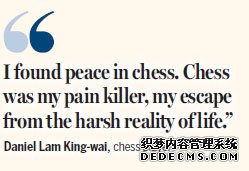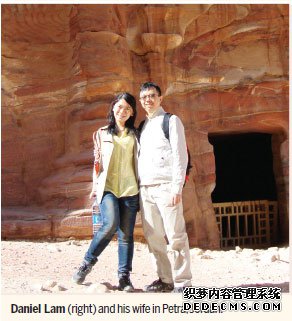Lam says he does not "enjoy playing", especially if the match is taking place in Hong Kong, as he usually gets too overwhelmed by the pressure to win, part of which, he admits, is self-inflicted. "Everyone is after me, anticipating good news," he says. Still he is constantly participating in chess tournaments, trying to win every game "just to feel secure".

Chess as therapy
"I found peace in chess. Chess was my pain killer, my escape from the harsh reality of life," says Lam. Looking back on those days he says if he hadn't resorted to the chess board, he would probably have turned into an emotional wreck.
分享按钮 0He knows too well that players are prone to making mistakes when they're close to winning and tend to rush things. "The more I feel I'm going to win, the slower and calmer I get because nothing's more frustrating than failing to win, or worse, losing a winning position."
Coping with pressure
His family immigrated to New Zealand when Lam was still quite young. Life there was slow and peaceful. Those were the days when Lam played like an old man, he says, laughing at the foibles of his younger days.
Also getting animated helps add color to a game that's often rather boring to watch, he points out. So his strategy is to inject a bit of psychological drama in the works - corner his opponent in a mind game until the latter has exhausted all methods of mounting a counter-attack.
Utterly distraught by the defeat, Lam had almost quit chess that night. He told his coach he would never touch chess again. With hindsight he realizes good gamesmanship is also about being able to take defeat "gracefully". He has now learnt to not show his frustration in front of opponents after losing a game. Shake hands, pack his bag and leave quietly - that's what he would normally do after failing to win, unless he is too awestruck by the performance of a stronger opponent, like it was when he lost to the Egyptian chess grandmaster Ahmed Adly last year.
Contact the writer at
Lam likens a chess game to a fist fight. "To win you can either punch the guy with great force or wear him out so completely (over a length of time) that he's too weak to mount a counter-attack," he explains. In the first case, the blow has to be a hard-hitting, power-packed punch that leaves the opponent completely unable to get up and fight back.

Back in Hong Kong, for a while he had to stop playing chess altogether to be able to cope with the pressures of a demanding job.
Daniel Lam is the first HK man to bag a top award at the World Amateur Chess Championship. He shares his winning formula with Wang Yuke.

